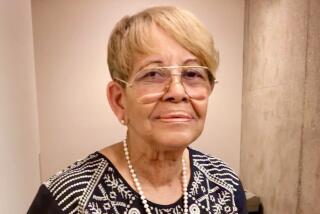She Is the First Black to Give Commencement Address : Integration Pioneer Returns to Speak at U. of Georgia
- Share via
ATHENS, Ga. — Charlayne Hunter-Gault, one of the two black students who first integrated the University of Georgia in 1961, returned to the campus here Saturday to chalk up another first.
Hunter-Gault, national correspondent for the McNeil/Lehrer NewsHour, became the first black speaker to deliver the commencement address at the northeastern Georgia university in its 185-year history.
“It’s good to be back home again, in a place I have always thought of as ‘our’ place,” Hunter-Gault, 46, told the 6,200 graduating seniors and professions students at a morning ceremony under sunny skies at Sanford Stadium.
“I first came here, in the words of Stephen Vincent Benet, ‘a brown girl bearing an idle gift,’ ” she said. “I stand before you now . . . not at peace but confident of my capacity and yours . . . because we have had our justice after all.”
It was an obviously moving moment for Hunter-Gault, who, 27 years ago, had to be shielded from rioting mobs by state troopers when she and Hamilton Holmes became the first black students to enter the university.
The two former classmates were graduated from the university in 1963. Holmes, who was in the audience for her commencement speech, is now an orthopedic surgeon in Atlanta and a member of the university’s board of trustees.
Hunter-Gault, who majored in communications, joined the McNeil/Lehrer program in 1978 after 10 years with the New York Times. She is the holder of 14 honorary degrees and numerous broadcasting awards.
The desegregation of the University of Georgia took place a year before the bloody integration of the University of Mississippi by James Meredith and two years before former Gov. George C. Wallace’s “stand in the schoolhouse door” to block the enrollment of two black students at the University of Alabama.
“Those were times of testing, yes, times of triumph, of pioneering and legend-building,” she said. “And if I had it to do all over again, I might have hoped for less of a struggle, but even so today I would welcome the challenge.”
Hunter-Gault acknowledged the strides in racial integration the university has made, noting that 1,200 of the university’s 26,000 students now are black and praising university President Charles Knapp for hiring 15 new black faculty members this year.
However, she deplored the rash of recent racial incidents on college campuses across the nation and what she described as a mean-spirited attitude toward minority aspirations on the part of the Reagan Administration.
“Something, I know not exactly what . . . has changed the consensus we forged in the ‘60s, and we are opening old wounds and beginning to experience new pain,” she said.
She called on her native South to set an example of racial harmony for the rest of the country. “No one here will pretend that the Old South is dead and buried,” she said. “The Confederate flag still flies on places on this campus.”
But, she added: “I believe the South’s understanding (of race), even when it was wrong, was always more coherent than the rest of the country. The South’s coherent understanding is the one really hopeful sign I see for America.”
In the most emotional moment in her address, Hunter-Gault paid tribute to her first husband and former University of Georgia classmate, Walter Stovall--a “man of bona fide white Southern credentials who boldly sought me out and was rock solid as a companion and friend.
“We married despite the uproar we knew it would cause because we loved each other,” she said, her voice choking and her eyes brimming with tears. “He gave up going to the movies because he knew I couldn’t get a seat in the segregated theater. He gave up going to the Varsity (a popular local drive-in restaurant) because he knew they would not serve me, although he said it was because the chili dogs tasted funny.”
She added that they are both now “happily married to other people” but that he remains a close friend and a good father to their daughter.
Hunter-Gault also read aloud a letter from another former white classmate who said that before coming to the University of Georgia she was “ ‘not aware of the suffering of blacks.’
“ ‘But your experience was visible to me. I watched from the window the night the mob came from over the hill . . . and the shock remains. For the first time I understood unreasonable cruelty, and I have not been an innocent since that night.’ ”
More to Read
Sign up for Essential California
The most important California stories and recommendations in your inbox every morning.
You may occasionally receive promotional content from the Los Angeles Times.













